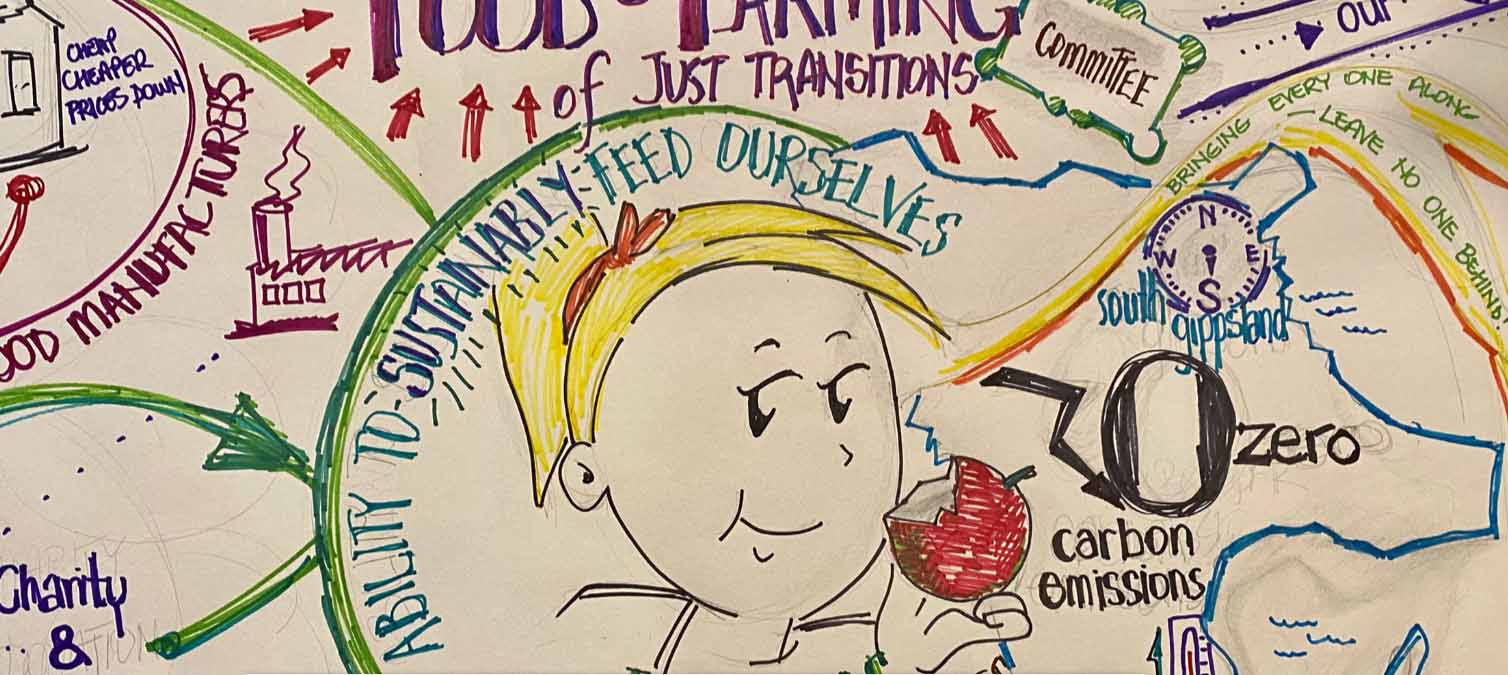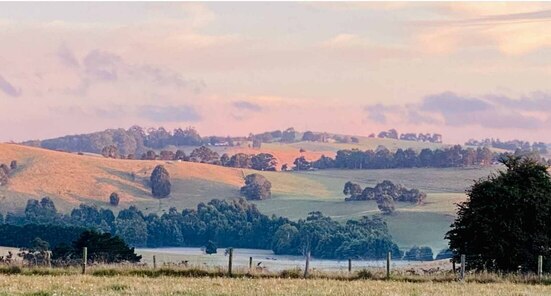AT THE beginning of August, a group of concerned residents of South Gippsland completed a draft roadmap for the transition required for a changing climate.
These residents have chosen “to address these problems head-on, bring about change, and champion a different way to participate and engage that ensures all voices in the community – even the softest ones – are heard, respected, and acted upon.”
Just Transition is the work of members of South Gippsland’s Prom Area Climate Action group (PACA), a body of citizens not unlike the Bass Coast Climate Action Group. I was part of the Just Transitions group for its first year but I stepped back a year ago, before the preparation of the Roadmap began, due to ill health.
For the sake of brevity for Bass Coast Post readers, I have selected sections of the Roadmap to provide what I consider to be the heart behind the initiative. The Roadmap’s words are set in book text while my words are italicised.
It begins with an acknowledgement of country, of course:
We respectfully acknowledge the Bunurong and Gunaikurnai peoples on whose unceded lands we live, work and play. We acknowledge their elders past, present and emerging, their Spirits and Ancestors as respected custodians of the land.
No one can deny that we are facing considerable social and environmental problems in the world, in Australia and within our own local community. Our future is at stake. We have a choice. We can wait, let others deal with it and endure the consequences of their actions. Or we can act.
The group is called Just Transition South Gippsland (JTSG). We are a movement aiming to bring positive change to our community and how we live. We aim to hasten the switch to a low-carbon world, while ensuring that no person or family is left behind. No one! This means meeting our own needs without compromising those of future generations. We seek a fairer and more inclusive community equipped with solutions for a better, cleaner, brighter future for all now and for those that follow.
I believe it is crucial to understand just how comprehensive the vision of the JTSG’s team has been, and I think the evidence of this is found in the Roadmap’s aims and objectives. There are nineteen of these, which at first glance seemed a lot, but upon reflection I could not find one I would remove. There were a few I hadn’t even considered and that was a humbling experience for me. The nineteen are listed here:
- Declaring a Climate Emergency & developing a Climate Action Plan;
- Respecting and working in partnership with Bunurong and Gunaikurnai community and community organisations in support of cultural land management practices and fire management;
- Commitment to mitigation and adaptive strategies, including reducing greenhouse gas emissions;
- Collaborative action required by all levels of government and civil society and people;
- Fostering community resilience and emergency response planning, including mitigation and adaptation to climate change;
- Restoring the integrity of the natural environment;
- Delivering a year-on-year increase in the proportion of private and public land set aside for biodiversity conservation;
- Developing a Sustainable Land Use and Biodiversity Strategy;
- Promoting a circular economy, including Waste and Resource Recovery;
- Promoting a shift to regenerative zero carbon farming;
- Encouraging the sustainable use of water for industry, households, and irrigation;
- Adopting participatory democracy and committing to extensive community consultation in the development of the Environmental Sustainability Strategy;
- Developing sustainable processing of food locally;
- Shift to a low carbon economy through a collaborative smart sustainable innovation system and capitalising on low carbon options (regenerative farming, renewable energies, biofertilisers etc,);
- Embracing the clean energy transition to use, produce and store energy while rapidly decarbonising the local economy and an active shift in the coming 5 years towards renewable electricity generation;
- Targets for zero-carbon transport energy infrastructure including EV charging system;
- Low carbon logistics and return of rail. Working with transport and freight to reduce carbon emissions;
- A re-evaluation of the vital role that health and care professionals play in our community;
- Sufficient supply of decent and affordable housing for all.
Of course, for the past several years, the South Gippsland Shire Council has been non-existent, its role carried out by a trio of political appointees who have been reluctant to make waves. With a shire election looming, the Roadmap makes it clear there is an important role for council and the media “to engage, inform and interact with residents”. The authors:
… call on the Council to commit to extensive community consultation in the development of strategies and plans, such that all South Gippsland residents are presented with an opportunity to contribute. The JTSG Strategy, which is being finalised in time for local council elections in October 2021, will propose the first steps toward the equitable low-carbon economy of South Gippsland region through infrastructure, policy-building and community engagement.

Headlining the plan must be the Declaration of a Climate Emergency followed by an emissions reduction pledge. In doing so, the Council will formally commit to take measurable action on the causes and impacts of climate change and commit to a community advisory role in the development and endorsement of a Climate Action Plan.
South Gippsland, like Bass Coast, has a diverse economy but in both regions agriculture is a mainstay and will continue to be so. So the Roadmap is predicated on information collected locally.
“Seventy-one percent of South Gippsland farmers identified land stewardship and leaving a legacy as their driving motivation for implementing sustainable practices'. (Just Transition Survey July 2021) We want our South Gippsland community to become more sustainable, culturally rich and prosperous; to be better able to respond to the challenges of climate change; to be welcoming, engaged and supportive; and to recognise that when we work together for the common good, we all win.
It really can be 'a place we are all happy to call home.'
This document summarises many hours of work and effort undertaken by members of JTSG to develop a more detailed strategy and presents the case for a new way forward. Full details can be discovered in the JTSG Strategy. Both the strategy and this Roadmap remain works in progress.
If you would like a copy of the full Roadmap or if you have any questions, please head along to jtsouthgippsland.org, or email [email protected].
